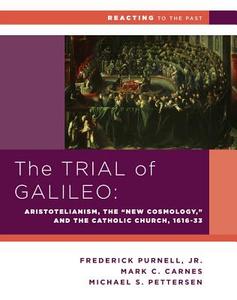
The Trial of Galileo - Aristotelianism, the "New Cosmology," and the Catholic Church, 1616-1633
Aristotelianism, The "New Cosmology," And The Catholic Church, 1616-1633
- Editore:
W. W. Norton & Company
- Collana:
- Reacting to the Past
- EAN:
9780393937343
- ISBN:
0393937348
- Pagine:
- 224
- Formato:
- Paperback
- Lingua:
- Inglese
Descrizione The Trial of Galileo - Aristotelianism, the "New Cosmology," and the Catholic Church, 1616-1633
In The Trial of Galileo the new science, as brilliantly propounded by Galileo Galilei, collides with the elegant cosmology of Aristotle, Aquinas and medieval Scholasticism. The game is set in Rome in the early decades of the seventeenth century. Most of the debates occur within the Holy Office, the arm of the papacy that supervises the Roman Inquisition. At times action shifts to the palace of Prince Cesi, founder of the Society of the Lynx-Eyed, which promotes the new science, and to the lecture halls of the Jesuit Collegio Romano. Some students assume roles as faculty of the Collegio Romano and the secular University of Rome, the Sapienza. Others are Cardinals who seek to defend the faith from resurgent Protestantism, the imperial ambitions of the Spanish monarch, the schemes of the Medici in Florence, and the crisis of faith throughout Christendom. Some embrace the "new cosmology", some denounce it, and still others are undecided. The issues range from the nature of faith and the meaning of the Bible to the scientific principles and methods as advanced by Copernicus, Kepler, Tycho Brahe, Giordano Bruno, and Galileo. Central texts include Aristotle's On the Heavens and Posterior Analytics; Galileo's Starry Messenger (1610), Letter to Grand Duchess Christina (1615) and Dialogue on the Two Chief World Systems (1632); the declarations of the Council of Trent; and the Bible.

